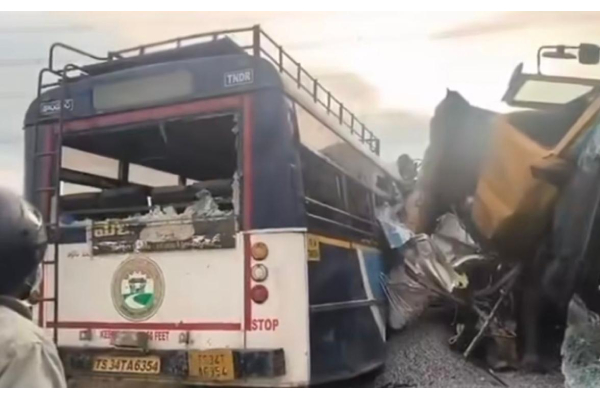Ranga Reddy district was shaken by yet another tragic road accident near Chevella, where a tipper truck rammed into an RTC bus travelling from Tandur to Hyderabad. The violent impact caused gravel to spill into the bus, trapping passengers and leading to horrific casualties. As of now, the death toll has climbed to 25, with several others critically injured. Authorities have shifted the wounded to Hyderabad for advanced treatment, while Transport Minister Ponnam Prabhakar is en route to the accident site. Officials fear that the number of victims may rise further.
A Pattern of Negligence
This is not an isolated incident. Just weeks earlier, in Nellore district’s Sangam mandal near Peraman, a speeding tipper on the wrong side of the national highway collided with a car, killing seven people, including a child. The mangled remains of the vehicle told a story of reckless driving and poor enforcement. From one state to another, the pattern is disturbingly similar: overloaded tippers, unchecked speed, negligent driving, and weak monitoring. Each tragedy leaves behind grieving families.
Why Tipper Drivers Need Separate Licensing
Driving a tipper or other heavy vehicle is vastly different from operating a car or a light motor vehicle. These massive trucks carry tons of material and require specialised skills, patience, and an understanding of braking distances, weight balance, and road safety dynamics.
Currently, most tipper drivers operate under standard heavy vehicle licences, often obtained through minimal testing or informal training. It’s time to change that.
Speeding remains the single most significant factor in most tipper-related accidents. These vehicles are not built for high velocity; the sheer mass makes them uncontrollable at higher speeds.
Authorities must:
Install speed governors on all heavy transport vehicles.
Implement GPS-based real-time monitoring for tippers and sand transport trucks.
Enforce strict penalties and license suspension for those violating speed norms.
Every major road tragedy sparks a momentary outcry, followed by silence until the next disaster. It’s time for that cycle to end. The Chevella accident is not just another statistic; it’s a warning. Unless systemic reforms are introduced and enforcement tightened, these deaths will continue to haunt our highways.



































